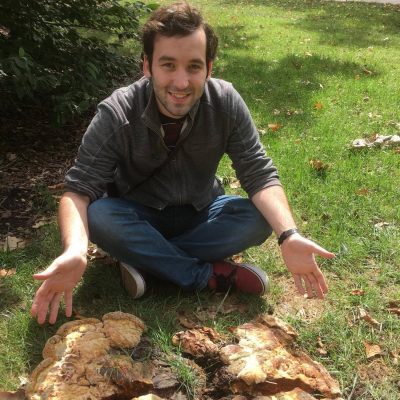Postdoc Spotlight: Chase Mayers

October 5, 2020
Chase Mayers is a postdoc in the School of Integrative Plant Science from Gonzales, Louisiana. He holds a B.S. from Louisiana State University and Ph.D. from Iowa State University, both in microbiology, and his research at Cornell focuses on plant root-associated fungi and the bacteria that live inside those fungi. He is a recipient of a Postdoc Achievement Award as part of Cornell’s celebration of National Postdoc Appreciation Week 2020.
What is your area of emphasis? Why is this work important?
I’m a mycologist first, microbiologist second. All of my research has involved the interaction of fungi with other organisms—symbiosis! That includes my work here in the Pawlowska lab on plant root-associated fungi and the bacteria that live inside those fungi. Fungi are an enormous but underappreciated part of the world around us, and it’s so important to understand how they interact with that world. They feed us, they make us sick. Some are vital to the health of crops we depend on, others are crops’ worst enemies. They are highways for bacteria and turn ants into zombies!
What inspired you to choose this field of study?
I don’t have an inspiring first step—I went to college to be in marching band. Every step of the way, it has been mentors who pointed me in the right direction. First the undergraduate research advisor who inspired me to teach and head to graduate school, next the mycology professor who steered me towards fungi. After that, it was my Ph.D. advisor who sold me on insect-fungus symbiosis and taught me a great deal about science. Now I really do love mycology, despite the roundabout way of ending up there. That’s how it is sometimes!
What does receiving a Postdoc Achievement Award mean to you?
It means a great deal, because the award shows that mentoring (an often-overlooked part of the postdoc role) is valued. Next to teaching, it’s my favorite part of the academic experience. The mentor-mentee relationship is its own kind of symbiosis, and I learned a lot and benefitted greatly from it! To the Pawlowska lab undergraduates, trainees, and peers (formal mentees or otherwise) who contributed to that experience here at Cornell—Agnieszka, Danyel, Eileen, Eric, Evaniya, Lev, Madiha, Maria Laura, Mikaela, Nina, Saman, and Thomas—thank you!!
What hobbies or activities do you enjoy in your spare time?
I like to take walks in the beautiful natural spaces of Ithaca with my partner, creeping around with a hand lens and registering iNaturalist observations of fungi, bugs, and plants. Besides that, I enjoy playing D&D (almost always in the dungeon master role) and board games, listening to improv comedy podcasts, curating my highly selective Spotify playlists, and dabbling in indie game development with my brother and cousin.
Why did you choose Cornell?
What pulled me towards Ithaca was my partner, who moved here before me to start her Ph.D. in soil and crop science. What actually brought me here was an NSF fellowship graciously hosted by the Pawlowska lab, an excellent fungus symbiosis lab headed by an excellent human being. I’m so lucky that these ended up being not only in the same city, but in the same building! Even without these driving factors, the deep history of mycology and plant pathology at Cornell and the abundant natural beauty make it a dream to study and live here.
What is next for you?
Teaching at the university level has been my goal since before graduate school. At the beginning of this semester, I started a full-time staff position in SIPS as a Teaching Support Specialist. Helping deliver quality instruction in plant pathology and mycology in a unique semester like this, when almost everything is done virtually at a distance, has been a challenge but one that is well worth it! I’m so grateful for the excellent team of graduate and undergraduate instructors who support myself and the professors in charge of both courses. Same to the students for being so patient and understanding.
Do you have any advice for current graduate students?
If you know your passion and where you want your degree to take you, seek out that experience directly, especially if it isn’t in the curriculum. For example, seeking teaching certifications and teaching workshops was probably the best decision I made in graduate school. At Cornell, the GET SET workshops, NextGen Professors Program, and other CTI and Future Faculty and Academic Careers programming serve the same role. Also, if your department has a graduate student organization, participate!! It takes buy-in to make GSOs work, but it’s so worth it. Lastly, you’re doing a great job, and your thesis is going to be awesome.
